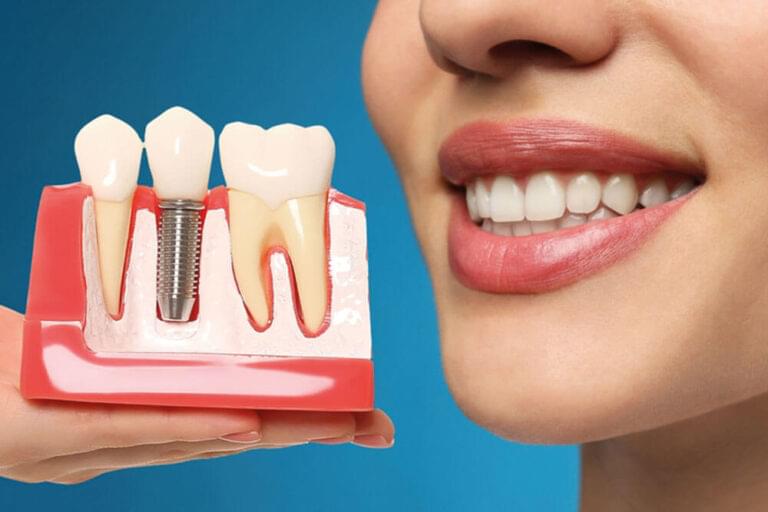The Dental Implant Healing Process: What to Expect and How to Prepare

Getting dental implants is a significant step toward restoring your smile, comfort, and confidence. Since you’re about to undergo surgery, preparing for the recovery from dental implants is just as crucial as the procedure itself. Understanding the dental implant healing process can help you plan ahead, minimize discomfort, and ensure the best possible outcome.
This guide will walk you through what to expect, how to manage recovery, and financial considerations to make sure you’re making a wise investment in your health.
What to Expect Immediately After Surgery
The first 24 to 48 hours after your dental implant procedure are the most critical in the recovery from dental implants. You will likely experience some swelling, bruising, and mild to moderate discomfort. These are all normal parts of the dental implant healing process as your body begins to adjust to the implant.
Common Symptoms After Surgery
Swelling: Peaks within 48 hours and gradually decreases.
Bruising: May appear around the jaw and cheeks.
Minor bleeding: This usually subsides within a few hours.
Discomfort: Manageable with prescribed or over-the-counter pain relievers.
During this time, rest is essential. Avoid strenuous activities, and follow your dentist’s instructions carefully to prevent complications.
The First Week: Managing Healing and Comfort
Diet and Nutrition
Eating the right foods can speed up the dental implant healing process and prevent irritation at the surgical site. Stick to soft, nutrient-rich foods such as:
Smoothies (avoid seeds)
Yogurt and soft cheeses
Scrambled eggs
Mashed potatoes
Oatmeal
Soft fish
Blended soups
Applesauce
Avoid hot, spicy, crunchy, or sticky foods, as they can disrupt healing and cause discomfort. Also, avoid using a straw, as the suction can dislodge blood clots and interfere with the healing process.
Oral Hygiene Care
Good oral hygiene is crucial during your recovery from dental implants to prevent infection. However, be gentle:
First 24 hours: Avoid rinsing or brushing near the implant site.
After 24 hours: Rinse gently with warm salt water 2–3 times a day.
Brushing: Use a soft-bristled toothbrush and avoid the implant area initially.
Flossing: Be cautious around the surgical area to avoid irritating the gums.
Weeks 2–6: Osseointegration Phase
Osseointegration is the process where your jawbone fuses with the implant, creating a strong foundation for your new tooth. This stage is the most critical part of the dental implant healing process and can take several months.
What to Expect During This Time
Reduced swelling and discomfort – Most pain subsides within two weeks.
Gradual return to normal eating – You can introduce firmer foods as healing progresses.
Limited physical strain – Avoid high-impact activities that could stress the implant.
Foods to Reintroduce Gradually
As your healing progresses, you can begin adding foods such as:
Soft pasta
Cooked vegetables
Ground meat
Soft bread
Soft fruits like bananas or ripe peaches
Avoid biting directly into hard foods like apples, nuts, and raw carrots until your dentist clears you for normal eating.
While the healing process varies from person to person, patience is key. Rushing can compromise the implant’s success.
Months 2–6: Full Integration and Final Restoration
During the later stages of recovery from dental implants, your dentist will monitor your progress and determine when it’s time to place the permanent crown. You may receive a temporary crown before the final prosthetic is secured.
What to Expect in This Stage
· Regular dental visits to check progress
· Temporary crown placement before the final restoration
· Careful monitoring to ensure full osseointegration
Signs That Your Implant Is Healing Properly
· No pain or discomfort at the implant site
· No movement of the implant
· Healthy gum tissue surrounding the area
By the six-month mark, most patients are fully healed and ready for the final step of their dental restoration.
Common Concerns During the Healing Process
Even with a well-planned dental implant healing process, you may experience some concerns along the way. Here’s how to address them:
Pain That Doesn’t Subside
While discomfort is normal, severe or prolonged pain could indicate infection or an issue with healing. Contact your dentist if pain persists beyond two weeks.
Swelling or Pus at the Implant Site
This may be a sign of infection if you notice ongoing swelling, pus, or a foul taste. Early treatment prevents serious complications.
Loose Implant Feeling
An adequately integrated implant should feel like a natural tooth. If you notice movement, seek dental attention immediately.
Financial Considerations During Recovery
As someone who values wise financial decisions, it’s worth planning for any potential post-surgery costs. Some key considerations include:
Follow-up visits: Regular check-ups ensure your implant is healing correctly.
Potential adjustments: Occasionally, minor modifications may be needed.
Long-term maintenance: High-quality implants are an investment, but they require proper care.
Unexpected costs: Be prepared for possible medications, additional procedures, or soft-food dietary expenses.
If your insurance doesn’t cover implants, consider financing options such as payment plans, health savings accounts (HSAs), or medical credit programs to spread out costs while maintaining financial stability.
Long-Term Care and Maintenance
Once your dental implant has fully healed, proper care will ensure it lasts a lifetime. While implants don’t decay like natural teeth, they still require diligent maintenance.
Daily Oral Hygiene
Brush twice daily with a soft-bristled toothbrush.
Use non-abrasive toothpaste to avoid scratching the implant.
Floss with implant-friendly floss or a water flosser to prevent plaque buildup.
Foods to Continue Avoiding
Hard foods like ice, raw nuts, and hard candy can damage the crown.
Sticky foods such as caramel or gum may dislodge components.
Routine Dental Visits
Schedule cleanings and checkups every six months.
Your dentist will check for any signs of implant complications.
Warning Signs to Watch For
Persistent discomfort, redness, or swelling.
A loose or shifting implant.
By maintaining good habits, you can protect your investment and enjoy a strong, lasting smile.
Frequently Asked Questions About Recovery from Dental Implants
How long does the dental implant healing process take?
The full recovery process varies by individual but typically ranges from three to six months. Osseointegration, where the implant fuses with the bone, takes the longest.
Can I smoke or drink alcohol during recovery?
It’s strongly advised to avoid smoking and alcohol, as both can slow healing and increase the risk of implant failure.
When can I go back to work after dental implant surgery?
Most patients can return to work within 1–3 days, depending on the complexity of the procedure and individual comfort levels.
What should I do if my implant feels loose?
A loose implant is not normal and could indicate a healing issue. Contact your dentist immediately.
Can I exercise after getting dental implants?
Avoid strenuous activities for at least a week. Light walking is fine, but intense workouts can increase swelling and bleeding.
Will I need pain medication during recovery?
Most patients use over-the-counter pain relievers such as ibuprofen or acetaminophen. Your dentist may prescribe stronger medication if needed.
How can I ensure my implant lasts a lifetime?
Maintain good oral hygiene, visit your dentist regularly, and avoid habits like grinding your teeth or chewing hard objects.
Tips for a Smooth Recovery
Follow your dentist’s instructions carefully.
Stay hydrated, but avoid straws (suction can dislodge blood clots).
Use ice packs for swelling in the first 48 hours.
Sleep with your head elevated to reduce swelling.
Avoid smoking and alcohol, as they can delay healing.
Attend all follow-up appointments to ensure your implant is progressing as expected.
Monitor your symptoms to catch any potential issues early.
Engage in light activity to promote circulation, but avoid intense exercise.
Invest in dental care tools such as a water flosser to keep your implant area clean.
Eat foods rich in vitamins A and C to aid in tissue regeneration.
Limit sugar intake to reduce the risk of infection.
Your Path to a Confident, Lasting Smile
Your recovery from dental implants is a temporary phase that leads to a healthier, permanent, confident smile. With the right preparation and mindset, you can ensure a smooth dental implant healing process and get the best results from your investment.
Taking the time to understand each phase of the dental implant healing process and preparing for it wisely will help you feel in control and confident as you move toward your new, lasting smile.
If you’re considering dental implants or have questions about your recovery, don’t wait—schedule a consultation with your dentist today. A personalized plan can help you feel confident every step of the way and ensure the best possible results. Your new smile is closer than you think!
Why Total Freedom?
Total Freedom is a custom solution and one of the most well recognized dental implants providers in Scottsdale and Phoenix.
We’re about providing the treatment that best fits you. That could mean a full set of new teeth. It could mean fewer implants than you anticipated. It could mean you don’t require any implants at all. When we can save the teeth you have, that’s what we recommend.
Restore Your Confidence
People travel from all over the country to Arizona for consultations and treatment with Dr. Kaiser. It’s unquestionably worth the trip.
Whether you’re seeking a first or second opinion, or even if you decide to choose another dental provider, a consultation with Dr. Kaiser will provide you with invaluable insights into your unique dental situation and the available options. You won’t be disappointed.
info@totalfreedomdental.com
the Latest From Our Blog
Dental Implants vs Dentures: Which is the Better Choice for You?
Both dental implants and dentures have their pros and cons. And both dentures and dental implants have come a long way in the past 10
What Dental Implants Look Like
What Dental Implants Look Like: A Complete Guide to Natural Smiles Have you ever asked yourself, what do dental implants look like once treatment ends?
How Much do Dental Implants Cost?
How Much Do Dental Implants Cost? Worrying about price is normal. It’s like standing in an auto repair shop after hearing a strange engine noise:









